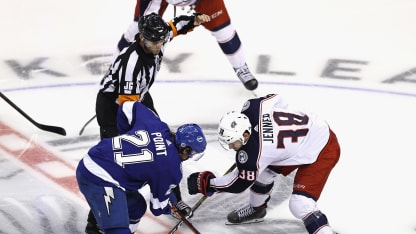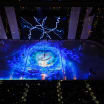Welcome back, Lightning fans! Most of you already know that this NHL regular season will have some new wrinkles to it. Teams will play 56 games, instead of the usual 82. Clubs will compete exclusively within their own newly-formed divisions. And virtually all the contests will be played in blocks of two consecutive games between the same opponents. What will be the impact of these three changes?
Mishkin's Musings: 56 games, division play and mini-series scheduling
Radio broadcaster Dave Mishkin breaks down some of the changes the Bolts will face in this unique season

© Getty Images
56 Games: During an 82-game season, it's important for teams to avoid slow starts. It can be difficult to make up ground in the standings as the season progresses. That's not to imply that it's impossible. Just last year, the Lightning did it. After 34 regular season games, the Bolts were 17-13-4 and in sixth place in the Atlantic Division. A 23-2-1 run over the next 26 games propelled them into second place and a secure playoff position. But such streaks don't come along often. Typically, a team that is closer to the bottom than the top of its division after 35 or 40 games isn't able to move up.
This year, the urgency to begin well is heightened even more. With 26 fewer games on the schedule, teams have less runway in front of them. The need to get off to a good start isn't lost on the Lightning. During Sunday's media day, defenseman Victor Hedman said, "It's a shortened season. We can't afford to have a slow start. We can't afford to have a two-week slump. You can't afford to fall behind the eight ball. It's going to be tough to climb back in because teams are going to play against one another the whole time and it's going to be tough to climb up again if you fall behind early."
Divisional-Only Play: The Lightning will play their 56 games against the other seven teams in the "new" Central Division: Carolina, Chicago, Columbus, Dallas, Detroit, Florida, and Nashville. Therefore, every one of those 56 will be "four-point" games, meaning that, depending on the outcome, there could be as much as a four-point standings swing between the clubs.
Under this format, regulation losses will sink a team even more quickly than during a typical year. Let's say that, on a given night, all eight Central teams are in action. A regulation loss would mean that not only did your club surrender two points to its opponent, it also lost two points to the three other divisional winners that evening. If any of those contests went into overtime, then the losing club(s) also gained a point.
In the earlier quote, Hedman referenced the challenge of climbing back into the race "because teams are going to play against one another the whole time". He's right - in a comeback effort, even one isolated defeat slows momentum and makes the climb a steeper one. But I'm also curious to see whether this divisional-only format creates more volatility than usual. Since every game is a four-pointer, perhaps we may see more movement within the divisional standings than usual, even in this shortened campaign.
Mini-Series Scheduling: With 56 games against seven opponents, the Lightning will play each divisional foe eight times, with four contests taking place at home and four on the road. Almost exclusively this season, the Lightning will play two consecutive games against the same opponent in the same city. Then they see another team for two straight, etc. There are only four breaks from that routine. They play three in a row at Chicago in early March, so their final road game at Chicago is a solo one in late April. Two games in Detroit follow, so the overall trip is a three-gamer. Then there are two instances in which they host Florida for one game. But those matchups either immediately precede or follow two other contests between the clubs in Sunrise, meaning those will be three-game sets.
So the Lightning - along with the rest of the league - will be seeing their opponents in bunches. This is new. A typical hockey regular season schedule might include the odd home-and-home series between two clubs that are geographically close. But consecutive games for the same teams in the same city usually don't happen until the playoffs.
There was an exception for the Lightning last year, though. In November of 2019, the Global Series games between the Lightning and Buffalo Sabres took place on consecutive days in Stockholm. In the first contest, the Lightning dominated play. The Sabres pushed back hard on the second night and were much more competitive, even though the Lightning ultimately prevailed in that game, too.
I wouldn't be surprised if the two-game sets throughout the season follow a similar script. The team that loses the first game will be motivated to salvage a split. They may not get it, but the winning team from the first game should expect fierce pushback from the opposition when the puck drops for the second game.
Given the shortened season, divisional-only play, and mini-series scheduling, this NHL regular season figures to be an intense one right from opening night.


















